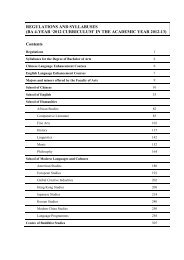Bachelor of Arts (BA) - The University of Hong Kong
Bachelor of Arts (BA) - The University of Hong Kong
Bachelor of Arts (BA) - The University of Hong Kong
Create successful ePaper yourself
Turn your PDF publications into a flip-book with our unique Google optimized e-Paper software.
state wiping out all democratic institutions. <strong>The</strong> Nazi persecution <strong>of</strong> the Jews and occupation,exploitation and domination <strong>of</strong> much <strong>of</strong> continental Europe in World War II became one <strong>of</strong> the blackestchapters in the history <strong>of</strong> Europe. With the fall <strong>of</strong> Berlin and the suicide <strong>of</strong> Hitler in 1945, the Germanpeople were able to gain freedom and democracy again. In our course we will not concentrate on Hitleralone but study the outcome <strong>of</strong> World War I and the revolutions <strong>of</strong> 1918-19 on the mentality <strong>of</strong> theGerman people, consider the problems <strong>of</strong> the fledgling Weimar Republic, and discuss the era <strong>of</strong> fascismin Germany and Italy, the nazification <strong>of</strong> culture and society, the Holocaust, and German aggressionagainst Europe in World War II.Assessment: 100% coursework.203HIST2038.Germany, 1871-1990: From unification to reunification (6 credits)(This course is also <strong>of</strong>fered to second and third year non-<strong>BA</strong> students for inter-Faculty broadeningpurposes.)Germany, the largest country in Western Europe, needed a long time to build up a sovereign nationalstate and to develop a common national identity. After the unification was achieved in 1871, internaland external political struggles led the country in two devastating wars in 1914 and 1939. Following theSecond World War two independent German republics, controlled by their respective superpowersUSA and USSR, developed into a capitalist and communist society. Reunification was finally achievedin 1989/90 by the collapse <strong>of</strong> the Soviet power in Central Europe. <strong>The</strong> course surveys the mostimportant developments within the German Imperial Empire, the Weimar Republic, Nazi Germany, andthe Federal Republic and German Democratic Republic. We will study topics such as conservatism,liberalism, nationalism, imperialism, and socialism, the two World Wars, and concentrate on thedevelopments and changes <strong>of</strong> the different political and economic systems in modern German history.Assessment: 100% coursework.HIST2039.War and peace: Conflicts and conflict resolutions since 1945 (6 credits)(This course is also <strong>of</strong>fered to second and third year non-<strong>BA</strong> students for inter-Faculty broadeningpurposes.)War is an extension <strong>of</strong> politics. True or false? <strong>The</strong> objective <strong>of</strong> the course is to understand a) the nature<strong>of</strong> military conflicts, war and warfare and b) the ways and means <strong>of</strong> maintaining and keeping peacewithout resorting to war. In-depth case studies <strong>of</strong> major conflicts and conflict resolutions will beprovided.Assessment: 100% coursework.HIST2040.Life in Tokugawa Japan, 1603-1868 (6 credits)(This course is also <strong>of</strong>fered to second and third year non-<strong>BA</strong> students for inter-Faculty broadeningpurposes.)Tokugawa society was colourful, interesting, multidimensional and full <strong>of</strong> energy. <strong>The</strong> periodwitnessed great urban expansion and advancement in rural technology. Students will enjoy looking atthe ways <strong>of</strong> life <strong>of</strong> Tokugawa lords and merchants living in the great cities and castle towns, and that <strong>of</strong>the peasants in the countryside. <strong>The</strong> rich cultural life <strong>of</strong> the period also makes fascinating study.Assessment: 100% coursework.
















